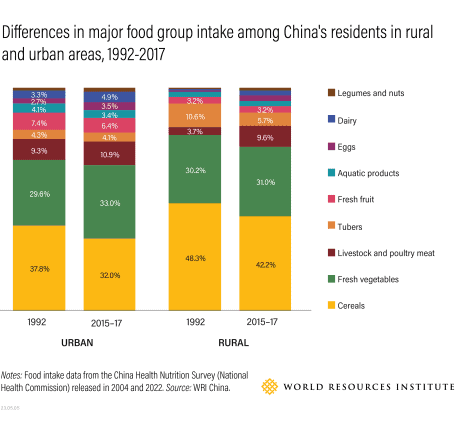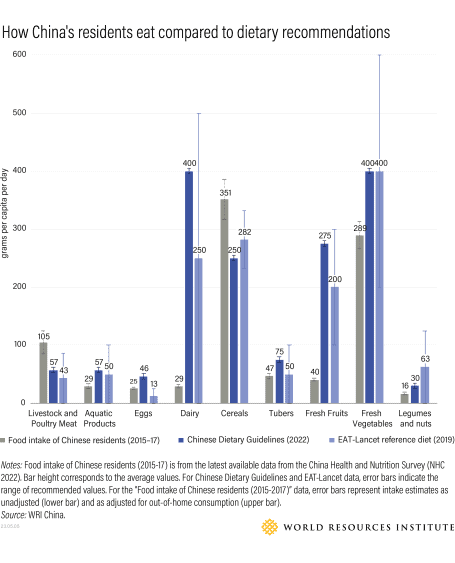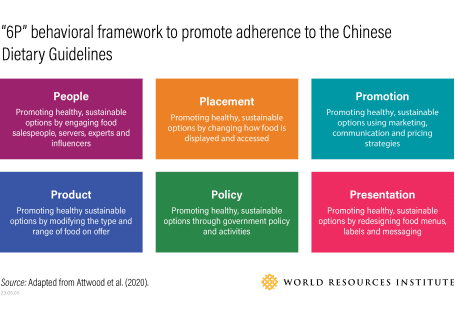7 minutes read
Over the past several decades, China’s economic development has driven significant changes to dietary trends in the country. As incomes rise, many traditional ways of eating are being replaced with diets that are higher in salt, fat, sugar and animal products. And while undernutrition is now rare, obesity, high cholesterol and Type 2 Diabetes are on the rise.
This article outlines how one research initiative is shedding light on the potential of behavioural science to advance healthy and sustainable diets in China, in line with the nation’s dietary guidelines and areas where philanthropy can make a deep and meaningful impact and accelerate progress.
An Unprecedented Opportunity
In 2022, President Xi Jinping’s government responded to dietary changes in China with two major aims to improve the nation’s food security which also helps China’s population eat more sustainable and healthy diets. This included a “Big Food” concept, which calls for an effective supply of major food groups and protein diversification, improving the efficiency of domestic agricultural production, and reducing food waste; and an update to China’s Dietary Guidelines to transition more people to healthier eating habits.
Following China’s latest dietary guidelines will help to accelerate low-carbon development. By one conservative estimate, 146 to 202 million metric tons of greenhouse gas emissions from agriculture could have been avoided annually if the Chinese population followed the dietary guidelines released in 2016.
In new research on China’s sustainable food choices, World Resources Institute (WRI) finds the recommendations in the 2022 dietary guidelines are optimized for planetary and human health. The challenge, though, is how the government and other important actors can encourage widespread adoption of the guidelines among China’s 1.4 billion people. Here, we outline a behavioural science framework to do just that.
Food Trends in China Today
Geography, socioeconomics, history, culture and gender all contribute to different eating habits across China. As in many parts of the world, a single common diet in the country does not exist. However, some noticeable patterns have emerged over the past 30 years.
As incomes and urbanisation have increased and the market opened to more global trade, so have the quantity and types of food many people in China consume. Overall, the proportion of cereals eaten at home declined from 1992 to 2017, with intake dropping from 38% to 32% of the total urban major food group intake, and from 48% to 42% of the total rural major food group intake. In general, cereal crops have tended to be replaced by other types of food as the Chinese diet has diversified and the population consumes more protein from animal-based sources.
Many of the recommendations in China’s Dietary Guidelines strongly align with those of the Eat-Lancet planetary health diet. Were the Chinese population to adopt the 2022 dietary guidelines, environmental gains would be possible in addition to the health benefits.
Currently, though, the Chinese population’s intake of livestock and poultry meat and cereals exceed the maximum recommendations in the dietary guidelines and the planetary health diet. The remaining major food groups — including aquatic products, legumes and nuts, dairy, fresh fruit, fresh vegetables, and tubers — are all consumed at lower amounts than is recommended.
A Framework for Shifting China’s Dietary Habits
Worldwide, many national governments struggle to convince their populations to adopt their national dietary guidelines. Behavioural science can help. WRI previously identified 57 behaviour change interventions to promote plant-rich diets that are good for both people’s health and the planet’s health. Because this research was drawn from the experience of primarily Western food service, we have adjusted the framework to be relevant in a Chinese context. Following consultations with around 40 authors of key research, existing contacts from WRI’s China office and WRI’s Food program, and experts recommended by other interviewees, we have identified the below six prongs to that framework, and examples that are especially relevant for China.
People interventions include behaviour change strategies that promote healthy, sustainable options by engaging food salespeople, servers, experts, and influencers. Among some of the biggest opportunities are enlisting medical professionals to amplify messages about the importance of eating in line with China’s Dietary Guidelines, as well as targeting efforts at family members who are primarily responsible for cooking in their households. Because communal cooking is prevalent in China, influencing the so-called “home chef” can ensure the rest of the family eat differently too.
Product interventions promote healthy sustainable options by modifying the type and range of food offered. Expanding the use of tofu is a good example, as it’s already a widely consumed protein source in China. Given its existing popularity and familiarity to Chinese diners, there’s potential to replace the meat in many dishes with tofu all together, or to swap a portion of the meat for tofu in dishes such as dumplings.
Policy interventions promote healthy, sustainable options through government policy and actions. To affect food choices, China will need to integrate climate, health and nutrition into a range of policymaking, as called for in a 2023 Academy of Global Food Economics and Policy report. Some concrete actions might include developing nutrition campaigns that promote eating in line with China’s Dietary Guidelines and giving families information about the climate impact of their food choices or providing financial support to poorer communities to boost purchasing of healthier, more sustainable foods.
Presentation interventions promote healthy, sustainable options by redesigning food menus, labels and messaging. Examples of messaging for use in China include focusing on the local benefits of healthy, sustainable foods – such as better air quality – as well as messaging that tells consumers that choosing foods in line with China’s Dietary Guidelines will allow them to feel good about themselves.
Promotion interventions involve promoting healthy, sustainable options using marketing, communications, and pricing strategies. Social media holds a lot of potential to help China’s government disseminate messaging such as eating advice for health and sustainable lifestyles. Social media and online platforms can also be used to share reviews and product ratings that can boost consumer choices for healthy and sustainable food products.
Placement interventions promote healthy, sustainable options by changing how food is displayed and accessed. Some examples include increasing the amount of a display or online screen that is dedicated to healthy and sustainable menu items or adding fresh fruits and vegetables to food displays that encourage consumers to choose these.The six categories for behavioural interventions we have outlined can go a long way to driving adoption of healthier and more sustainable eating habits. We believe that ultimately scaling China’s Dietary Guidelines will require tailoring the recommendations for different regions and demographic groups, conducting in-depth research in dietary trends and strategies to address these trends, conducting focused behavioural science trials to see what works, maximising the potential of online platforms such as social media and online food shopping to scale behaviour change efforts, and evaluating alternative proteins as a potential technology.
Philanthropic Opportunities to Accelerate Progress
Philanthropy has a key role to play in leveraging the power of behavioural science, which today is an underutilised lever to drive a shift in diets in line with the Chinese Dietary Guidelines and beyond.
Supporting further research will help to provide a powerful evidence base that expands our understanding of the strategies that will be most impactful and highly responsive to China’s regional diversity. Research to identify strategies for transforming food environments in e-commerce settings will be especially useful given the recent growth in online food purchasing. Another critical need is research to understand the environmental, nutritional, and economic implications of alternative proteins, and just what will be required to grow this sector in China.
Catalytic grants for piloting and scaling promising strategies will help realise the full potential of such behavioural science research.
Philanthropy can help support an ecosystem of funders, academics, civil society leaders, business leaders, and policymakers to build the movement for healthy and sustainable diets in China. Nurturing and strengthening this ecosystem through knowledge sharing, multidisciplinary research programs, blending international expertise with local knowledge, and aligning international and domestic philanthropy will truly accelerate progress.





















